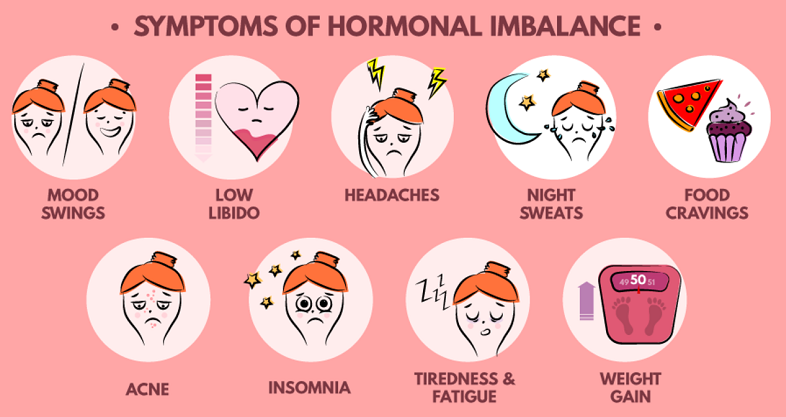
Are you struggling to lose weight despite your best efforts, leaving you feeling frustrated and helpless? You may be surprised to learn that hormonal imbalances could be the hidden culprit behind your weight gain. In this comprehensive guide, we will delve into the world of hormonal weight gain, uncovering the causes, solutions, and natural alternatives that can help you regain control of your body and overall health.
Contents
- Introduction to Hormonal Weight Gain
- Common Hormones Affecting Weight Gain
- Factors Contributing to Hormonal Imbalances
- Dietary Recommendations for Hormonal Balance
- Lifestyle Changes for Hormone Balance and Weight Management
- References
Introduction to Hormonal Weight Gain
Hormones play a crucial role in regulating various processes in our bodies, including metabolism, appetite, and fat distribution. Imbalances in these hormones can lead to weight gain, making it challenging for individuals to maintain a healthy weight despite their best efforts.
Definition and Overview
Hormonal weight gain refers to the accumulation of body fat resulting from imbalances in one or more hormones responsible for regulating metabolism and energy expenditure [1]. These imbalances can be caused by various factors, such as poor diet, lack of exercise, stress, and environmental toxins. By understanding the relationship between hormones and weight gain, individuals can take targeted actions to restore hormonal balance and improve their overall health and well-being.
Importance of Hormone Balance for Health
Maintaining hormonal balance is essential for overall health and well-being. Hormones act as chemical messengers, coordinating and regulating numerous bodily functions, including growth, development, reproduction, and immune function [2]. Hormonal imbalances not only contribute to weight gain but can also cause a wide range of health issues, such as mood swings, fatigue, insomnia, and increased risk of chronic diseases. Therefore, addressing hormonal weight gain is not only crucial for achieving a healthy weight but also for promoting overall health and preventing long-term health complications.

Common Hormones Affecting Weight Gain
Several hormones influence weight gain and metabolism, and understanding their roles can help individuals develop targeted strategies to manage hormonal imbalances effectively.
Cortisol: The Stress Hormone
Cortisol, often referred to as the “stress hormone,” is produced by the adrenal glands in response to stress, low blood sugar levels, and inflammation. While cortisol is essential for maintaining overall health, elevated levels can have negative consequences on weight management [3].
Effects on Appetite and Metabolism
High cortisol levels can lead to increased appetite, particularly for high-fat, high-sugar foods, which can result in weight gain. Additionally, elevated cortisol can contribute to insulin resistance, making it difficult for the body to regulate blood sugar levels and promoting fat storage, particularly around the abdominal area.
Ways to Manage Stress and Reduce Cortisol
To manage stress and reduce cortisol levels, consider incorporating stress-reduction techniques into your daily routine. Some effective strategies include practicing mindfulness meditation, engaging in regular physical activity, prioritizing sleep, and fostering social connections. Additionally, consuming a balanced diet rich in whole foods, such as fruits, vegetables, lean proteins, and whole grains, can help support healthy cortisol levels and overall hormonal balance.
Insulin: The Blood Sugar Regulator
Insulin is a hormone produced by the pancreas that helps regulate blood sugar levels by allowing glucose to enter cells for energy production or storage. Imbalances in insulin can have a significant impact on weight gain and fat storage [4].
Role in Weight Gain and Fat Storage
When blood sugar levels rise, the pancreas releases insulin to help cells absorb glucose. However, a diet high in refined carbohydrates and sugars can cause insulin levels to spike frequently, eventually leading to insulin resistance. Insulin resistance occurs when cells become less responsive to insulin signals, causing the pancreas to produce even more insulin to compensate. This excess insulin promotes fat storage, particularly in the abdominal area, and contributes to weight gain.
Strategies for Maintaining Stable Insulin Levels
To maintain stable insulin levels and promote healthy weight management, focus on consuming a balanced diet that emphasizes whole foods and minimizes refined carbohydrates and sugars. Include plenty of high-fiber foods, such as fruits, vegetables, legumes, and whole grains, which can help regulate blood sugar levels. Additionally, engage in regular physical activity to improve insulin sensitivity and support healthy blood sugar levels.
Estrogen and Progesterone: The Female Hormones
Estrogen and progesterone are the primary female sex hormones responsible for regulating the menstrual cycle, pregnancy, and various other reproductive functions. Imbalances in these hormones can also contribute to weight gain [5].
Impact on Fat Distribution and Metabolism
Estrogen helps regulate fat distribution, and imbalances can result in increased fat storage in the hips, thighs, and buttocks. Additionally, fluctuations in estrogen and progesterone levels throughout the menstrual cycle can cause temporary weight gain due to water retention and increased appetite.
During menopause, estrogen levels decline, which can lead to a slower metabolism and increased fat storage, particularly around the abdominal area.
To manage weight gain associated with hormonal shifts during menstruation and menopause, focus on maintaining a balanced diet, engaging in regular physical activity, and managing stress. Additionally, consider working with a healthcare professional to discuss possible interventions, such as hormone replacement therapy (HRT), to help manage symptoms and support overall hormonal balance.
Testosterone: The Male Hormone
Testosterone is the primary male sex hormone, responsible for regulating muscle mass, bone density, and various other functions. While testosterone is typically associated with men, it is also present in women, albeit at lower levels. Imbalances in testosterone can have a significant impact on weight gain and fat distribution [6].
Influence on Muscle Mass and Fat Distribution
In both men and women, testosterone plays a crucial role in maintaining muscle mass, which is essential for a healthy metabolism. Low testosterone levels can result in a decrease in muscle mass, leading to a slower metabolism and increased fat storage. Additionally, testosterone influences fat distribution, and imbalances can contribute to increased fat storage around the abdominal area.
Boosting Testosterone Levels Naturally
To support healthy testosterone levels, focus on incorporating regular strength training exercises into your fitness routine to build and maintain muscle mass. Additionally, consume a balanced diet rich in lean proteins, healthy fats, and essential micronutrients, such as zinc and vitamin D, which are vital for testosterone production. Managing stress, getting enough sleep, and maintaining a healthy body weight can also help support optimal testosterone levels.
Thyroid Hormones: Regulators of Metabolism
The thyroid gland produces hormones that play a critical role in regulating metabolism, energy production, and various other bodily functions. Imbalances in thyroid hormones can significantly impact weight management.
Hypothyroidism and Weight Gain
Hypothyroidism, or underactive thyroid, occurs when the thyroid gland does not produce enough thyroid hormones, leading to a slower metabolism and weight gain. Common symptoms of hypothyroidism include fatigue, constipation, dry skin, and hair loss.
Hyperthyroidism and Weight Loss
In contrast, hyperthyroidism, or overactive thyroid, occurs when the thyroid gland produces excessive thyroid hormones, resulting in a faster metabolism and weight loss. Symptoms of hyperthyroidism may include anxiety, irritability, rapid heartbeat, and difficulty sleeping.
Treatment Options and Lifestyle Changes
If you suspect a thyroid imbalance, consult with a healthcare professional for proper diagnosis and treatment. Treatment options for thyroid imbalances may include medication, such as synthetic thyroid hormones for hypothyroidism or antithyroid medications for hyperthyroidism. Additionally, making lifestyle changes, such as consuming a balanced diet rich in essential nutrients and engaging in regular physical activity, can help support healthy thyroid function and overall hormonal balance.

Factors Contributing to Hormonal Imbalances
Various factors can contribute to hormonal imbalances, leading to weight gain and other health issues. By identifying and addressing these factors, individuals can take proactive steps to restore hormonal balance and improve overall health.
Poor Diet and Nutrition
Consuming a diet high in processed foods, refined carbohydrates, and unhealthy fats can contribute to hormonal imbalances by causing inflammation, promoting insulin resistance, and negatively impacting hormone production. Additionally, inadequate intake of essential nutrients, such as vitamins and minerals, can impair hormone synthesis and function, leading to imbalances.
Lack of Exercise
Regular physical activity is essential for maintaining hormonal balance. Exercise helps regulate insulin sensitivity, supports healthy testosterone levels, and can reduce cortisol levels by promoting stress relief. A sedentary lifestyle can contribute to hormonal imbalances and increase the risk of weight gain and chronic diseases.
Stress and Anxiety
Chronic stress and anxiety can disrupt hormone balance by causing prolonged elevation of cortisol levels, leading to insulin resistance, increased appetite, and weight gain. Furthermore, stress can impair the production and function of other hormones, such as thyroid hormones and sex hormones, contributing to additional health issues.
Environmental Toxins
Exposure to certain environmental toxins, such as endocrine-disrupting chemicals (EDCs), can interfere with hormone production, function, and balance. EDCs are commonly found in various everyday products, including plastics, personal care products, and pesticides. Reducing exposure to these toxins can help support overall hormonal balance.
Genetics
Genetic factors can also play a role in hormonal imbalances [7]. Some individuals may have a genetic predisposition to conditions that affect hormone production and function, such as thyroid disorders or polycystic ovary syndrome (PCOS). In these cases, working closely with a healthcare professional is crucial to develop a personalized treatment plan that addresses the underlying genetic factors contributing to hormonal imbalances.

Dietary Recommendations for Hormonal Balance
Diet plays a crucial role in maintaining hormonal balance and overall health. By making mindful food choices and incorporating specific nutrients into your daily meals, you can support hormone production, function, and balance.
Emphasizing Whole Foods
Focusing on a diet rich in whole foods is essential for maintaining hormonal balance. Whole foods, such as fruits, vegetables, lean proteins, whole grains, and healthy fats, provide essential nutrients that support hormone synthesis and function. They also tend to have a lower glycemic index, which can help regulate insulin levels and promote healthy blood sugar management.
Including Adequate Protein
Consuming adequate amounts of protein is essential for hormone production, as proteins provide the amino acids necessary for hormone synthesis. Including high-quality protein sources, such as lean meats, fish, eggs, dairy, legumes, and nuts, can help support hormonal balance and overall health.
Incorporating Healthy Fats
Healthy fats, such as monounsaturated and polyunsaturated fats, play a vital role in hormone production and function. Incorporate sources of healthy fats into your diet, such as avocados, olive oil, nuts, seeds, and fatty fish, to support hormone synthesis and reduce inflammation.
Prioritizing Fiber-Rich Foods
Fiber-rich foods, such as fruits, vegetables, legumes, and whole grains, can help regulate blood sugar levels and support healthy insulin function. Additionally, fiber can promote healthy digestion and elimination, which is essential for maintaining hormonal balance.
Limiting Refined Carbohydrates and Sugars
Refined carbohydrates and sugars can cause rapid spikes in blood sugar levels, leading to increased insulin production and promoting fat storage. Limiting the intake of refined carbohydrates and sugars, such as white bread, pastries, and sugary beverages, can help maintain stable blood sugar levels and support overall hormonal balance.
Reducing Inflammatory Foods
Inflammation can contribute to hormonal imbalances and weight gain. Avoiding or limiting inflammatory foods, such as processed foods, trans fats, and excessive amounts of saturated fat, can help reduce inflammation and support hormonal balance. Additionally, incorporating anti-inflammatory foods, such as colorful fruits and vegetables, fatty fish, and nuts, can further promote overall health and well-being.
Lifestyle Changes for Hormone Balance and Weight Management
In addition to making dietary changes, adopting a healthy lifestyle is crucial for maintaining hormonal balance and managing weight gain.
Engaging in Regular Physical Activity
Regular physical activity is essential for maintaining hormonal balance and supporting healthy weight management [8]. Exercise helps regulate insulin sensitivity, supports healthy testosterone levels, and can reduce cortisol levels by promoting stress relief.
Combining Cardiovascular Exercise and Strength Training
A combination of cardiovascular exercise and strength training is optimal for hormone balance and weight management. Cardiovascular exercises, such as walking, jogging, swimming, or cycling, can help improve insulin sensitivity and promote healthy blood sugar levels. Strength training exercises, such as weightlifting or resistance training, can support healthy testosterone levels and maintain muscle mass, which is essential for a healthy metabolism.
Incorporating Mind-Body Exercises
Mind-body exercises, such as yoga, Pilates, and tai chi, can also support hormonal balance by promoting relaxation, reducing stress, and enhancing overall well-being. These activities can help lower cortisol levels and support healthy hormone function.
Prioritizing Sleep and Rest
Adequate sleep and rest are essential for maintaining hormonal balance, as many hormones are regulated during sleep. Poor sleep can contribute to hormonal imbalances, such as elevated cortisol levels, insulin resistance, and reduced testosterone production.
Establishing a Consistent Sleep Schedule
Establishing a consistent sleep schedule and aiming for 7-9 hours of sleep per night can help support hormone regulation and overall health.
Creating a Sleep-Friendly Environment
Creating a sleep-friendly environment, including a cool, dark, and quiet bedroom, can also promote restful sleep and support hormone balance.
Managing Stress and Anxiety
Effectively managing stress and anxiety is crucial for maintaining hormonal balance, as chronic stress can disrupt hormone production and function. Incorporating stress-reduction techniques into your daily routine can help support hormone balance and overall well-being.
Practicing Mindfulness and Relaxation Techniques
Practicing mindfulness and relaxation techniques, such as meditation, deep breathing exercises, or progressive muscle relaxation, can help reduce cortisol levels and promote overall hormonal balance.
Developing a Support Network
Building and maintaining a strong support network of friends, family, and healthcare professionals can help you manage stress and navigate the challenges associated with hormonal imbalances and weight gain.
Reducing Exposure to Environmental Toxins
Reducing exposure to environmental toxins, such as endocrine-disrupting chemicals (EDCs), can support overall hormonal balance. Some strategies for minimizing exposure include using glass or stainless steel containers instead of plastic, choosing organic produce when possible, and opting for natural personal care products free of harmful chemicals.
References
[1] Obesity and hormones
[2] Hormones: the body’s chemical messengers
[3] How to Stop Cortisol Weight Gain? Science-Backed Methods
[4] Insulin and weight gain: Keep the pounds off – Mayo Clinic
[5] Can estrogen levels affect weight gain?
[6] Is it Time to Test the Effect of Weight Loss on Testosterone?
[7] Hereditary Hormone Excess: Genes, Molecular Pathways, and Syndromes
[8] Role of Physical Activity for Weight Loss and Weight Maintenance

